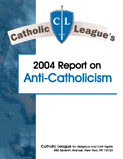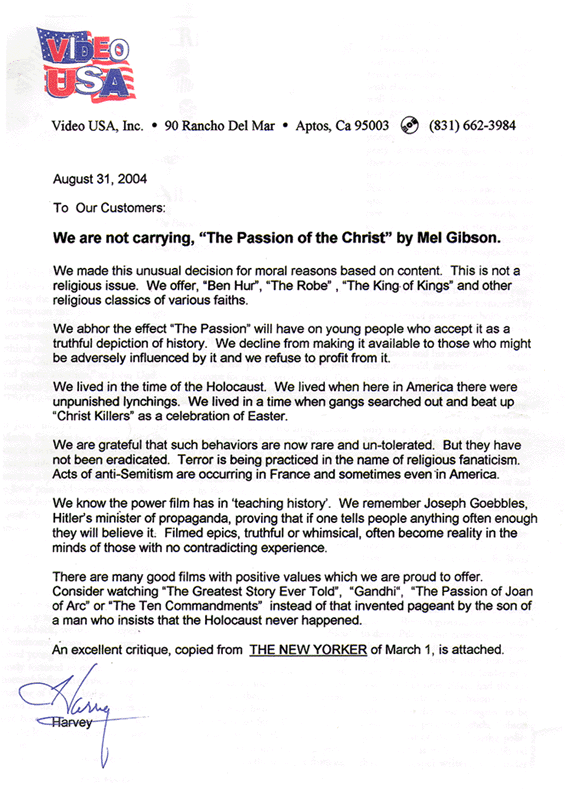January
Clayboys, a Canadian business that specializes in homosexual greeting cards, produced one called, “Yoga. Anywhere. Anytime.” The accompanying picture is of Jesus on the Cross with his feet in a yoga position; another card showed a man dressed as the Blessed Mother with the caption, “Our Lady of the Cross dressers”; and another included the Blessed Mother with the caption, “Holy Mary, Mother of God another birthday!”
March 24
Philadelphia, PA—After a complaint from the Catholic League, Urban Outfitters, a company that sells T-shirts and an array of merchandise targeted at young people, discontinued its magnetized figure of Jesus on the Cross; the figure of Jesus wearing underwear could be altered by putting various clothing items on it (e.g., a devil’s outfit and a hula skirt).
April
Mount Kisco, NY—An anti-Catholic flier was posted on the bulletin board in an exercise room of the Northern Westchester Cardiac Rehabilitation Center. The Catholic League wrote to the director of the center who responded by taking the flier down and writing a letter of apology.
July
Kentucky—A Safe Auto Insurance Company television commercial broadcast here (and in some parts of Pennsylvania) depicted a priest listening to a woman drone on and on in a confessional until he puts on headphones and ignores her. The Catholic League informed the company that the ad trivialized an important sacrament for Catholics. The company then pulled the ad.
August 31
Aptos, CA—The following letter was distributed to patrons of Video USA, a movie rental store:
October
Long Island, NY—Easter Unlimited, Inc./Funworld sold Halloween costumes of a man dressed as a priest shown with an erection, and a nun shown in full habit holding her pregnant stomach. The inscription on the ad for the priest costume said, “Keep Up The Faith”; the nun ad said, “Thank You, Father!” The costumes were sold in stores across the country.
Harvey Cohen, a store official, said he would not comment on whether the company, run by Stanley Geller, carried offensive rabbi or imam costumes. After a member of the Catholic League called the store to complain, Cohen said the item would not be sold next year.
October 31
California—A store employee of Safeway dressed as a pregnant nun for Halloween. The Catholic League made a formal complaint to the CEO of Safeway, Inc. We received an apology and a pledge that this would not happen again.
October 31
Amarillo, TX—At a Halloween workplace party in a health facility, a woman employee came dressed as a pedophile priest and another came dressed as a pregnant nun. The latter won the prize for “best costume.”
December
American Greetings was once again found selling a series of “rude” Christmas cards, while choosing not to offer any disrespectful cards for Hanukkah or Kwanzaa. Of over 200 Christmas e-cards, 39 were found in the “religious” category and 18 were “rude” (most featuring flatulence and urine jokes). All of the 35 “Happy Hanukkah” cards, the nine “family” Hanukkah cards, and the 14 “funny” Hanukkah cards were respectful. There were no disrespectful Kwanzaa cards among the 24 listed. There was also no “rude” section for Hanukkah or Kwanzaa among American Greetings’ Create and Print cards, just for Christmas (some of which included oral sex jokes).
Of Hallmark’s 104 Christmas cards, nine were religious, one mentioned Jesus and none featured a nativity scene. In its “humor” category, three had mild scatological references and one had sexual overtones. Of th
e five Hanukkah cards, four featured menorahs, even the one “humor” card. Of the six Kwanzaa cards, all were respectful and none was humorous.
Yahoo offered 31 categories of Christmas cards, one of which was “religious.” There were seven e-cards dubbed “risqué” and replete with sexual gags. In the “rude” category, there were 17 scatological-oriented cards. All of the 12 Hanukkah cards were respectful, most of which pictured a menorah or Star of David. All of the 24 Kwanzaa cards were respectful.
December
The Committee to Save Merry Christmas was formed. It started a boycott of Macy’s and Bloomingdale’s because parent company Federated Department Stores shunned “Merry Christmas” in ads and decorations. Federated soon placed a red and green “Merry Christmas” greeting on its corporate website with a message claiming that its divisions were free to use “Merry Christmas” in its advertising. Federated’s statement added, however, that the terms “Season’s Greetings” and “Happy Holidays” are “more reflective of the multi-cultural society in which we live today.”
December
Manhasset, NY—A Barnes & Noble store featured displays for Hanukkah, Kwanzaa, and “Holiday Gift Ideas”—but left out Christmas.
December
Minneapolis, MN—The diversity consulting firm ProGroup advised employers that the way to deal with what it called the “December Dilemma” (a term used by the ADL) is to “Keep holidays inclusive and informative.” The firm suggested, “Try using a seasonal theme rather than a holiday one. Establish new traditions around parties and end-of-year gifts.”
December
Pittsburgh, PA—Downtown retailers began calling Christmastime “Sparkle Season” ten years ago, claiming it was an attempt to be inclusive. After complaints from Christians, they changed it to “Downtown Pittsburgh Sparkles”—sparking even more complaints. This year, for the third time, the Pittsburgh Downtown Partnership called it “Downtown Pittsburgh, a Holiday Tradition With a New Twist.”
December
Albany, CA—Simma Lieberman Associates, a “multicultural” consulting company, bluntly told clients in a “Note for Employers”: “Make sure your holiday party isn’t a Christmas party in disguise. Decorations and food should be general, and non-specific to any religion.” Several lines later, the firm took the advice a step further: “Consider having a New Year’s Party instead of a holiday party.”
DecemberNew York, NY—For the third year, Time magazine CEO Ann Moore banned its decades-long tradition of throwing an employee Christmas party. The company still gives Christmas bonuses, but it refuses to use the “C-word” in referring to them. According to a Time, Inc. spokesman, “It’s not really a Christmas bonus…It’s just a nice gesture that Ann Moore started three years ago.”
December
New York, NY—Instead of the large, traditional green wreath with a red bow displayed in years past, New York City’s Bar Building placed over its exterior foyer window a big bundle of twigs shaped like a diam
ond. According to one tenant’s written complaint to the owner of the Bar Building, “A red sash, similar in substance to sheer red pantyhose, adorns the white bundle of twigs.” One Bar Building worker commented: “What are they trying to celebrate—the Blair Witch Project?” Tenant complaints finally spurred management to put up a Christmas Tree in the lobby. The building also continued its tradition of placing a Jewish menorah with a prominent Star of David on public display.
December 10
Cincinnati, OH—In an interview with the Detroit News, an attorney with Strauss & Troy in Cincinnati warned that “if the workplace is permeated with religious symbols—presumably of another religion—to the extent that the employee feels intimidated, ridiculed or insulted, he or she could make the claim that the company has allowed or created a hostile environment.”
December 10
San Francisco, CA—Littler Mendelson, the country’s largest employment and labor law firm, warned that “Renewed interest in moral values—as evidenced by the recent presidential election—and increased religious activity in the workplace can lead to clashes during the holiday season.” The firm recommended “a generic greeting card option” for employees sending cards to clients and contacts.
December 10
Riverhead, NY—An attorney with the Legal Aid Society of Suffolk County in Long Island placed a crèche next to a menorah that was on display in her office. Her boss moved it away from the menorah the next day and told her it did “not belong there.” When she asked why the menorah was on display, he replied, “that’s different.” After faxing a complaint to her main office, she was given permission to display the nativity scene where she had first placed it.
December 11
Plantation, FL—Fifty protesters demonstrated at Broward and Fashion malls against a policy of displaying a menorah but no nativity scene. They called for a boycott of Federated Department Stores, which owns Bloomingdale’s, Burdines and Macy’s, for removing references to Christmas from its advertising and store displays.
December 14
The Associated Press reported that “major corporations [are] barring religious music from cubicles and renaming the office Christmas bash the ‘end of the year’ party.”



